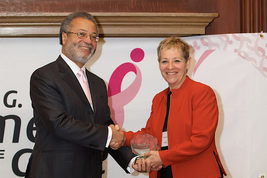Three organizations that serve the local LGBT and HIV/AIDS communities are among the recipients of a grant from the Philadelphia affiliate of Susan G. Komen for the Cure, which works to raise awareness of and funding for breast-cancer prevention and treatment.
The local Komen affiliate last week announced its 2009-10 grant recipients — 38 in all, including LGBT health clinic the Mazzoni Center, HIV/AIDS service organization BEBASHI and the Metropolitan Area Neighborhood Nutritional Alliance, which provides meals to area residents coping with life-threatening illnesses such as HIV/AIDS. Each organization will receive $40,000.
The Philadelphia Komen affiliate is dispersing a total of about $2.1 million in grants to organizations and programs throughout the tri-state area. The funded agencies are expected to provide outreach and services to nearly 60,000 women.
Komen, which has affiliates around the globe, has allocated more than $1 billion in funding initiatives since its 1982 inception. Komen’s sister founded the organization in her honor two years after she lost her battle with breast cancer.
Elaine I. Grobman, executive director of the Philadelphia Komen affiliate, said the three LGBT and HIV/AIDS organizations reflect the foundation upon which the agency was built.
“Mazzoni Center, BEBASHI and MANNA epitomize the grassroots efforts that make Susan G. Komen for the Cure a leader in the international breast-cancer movement,” she said.
Mazzoni Center executive director Nurit Shein said the grant will allow the facility to continue its efforts to promote breast health in the local lesbian, bisexual and heterosexual communities. Mazzoni has received the grant for the past four years.
“This allows us to do clinical breast exams and referrals for mammography for women who don’t have insurance,” Shein said, adding the funding also will assist the center in producing its Lesbian Health Resource Guide.
Shein said Mazzoni recently redoubled its efforts to attract more lesbian, bisexual and heterosexual female clients and, as a result, has seen an increase in these populations utilizing the center’s services in the past few months.
BEBASHI, which has received the Komen grant since 2007, will use this year’s allocation to fund its “Our Bodies” initiative, a program begun several years ago to provide breast-health services to local African-American women.
“We’re trying to raise awareness about the impact and risk of breast cancer with medically underinsured African-American women; we educate them, provide outreach and refer them for clinical breast examinations and/or mammograms,” said Gary Bell, executive director of BEBASHI.
He said that while the organization primarily provides HIV/AIDS and sexual-health services, the staff also felt it crucial to address breast-health issues.
“There are many health disparities, particularly in the African-American community, and in our communication with medically underserved women, it became apparent that one of the areas that didn’t seem to be enough of a priority for them was ensuring breast health,” said Bell. “It just seemed a natural type of program for us since we’re working with the same population, trying to educate them about sexual health. It was just a natural offshoot of what we’re doing.”
MANNA plans to use the Komen grant, which it also received in 2007, to continue home-delivery meal services for people with breast cancer.
Ann Hoskins-Brown, MANNA’s director of institutional giving, said the program began in 2006 and, in the past fiscal year, delivered a full week’s worth of meals every week to about 85 area residents who are battling breast cancer.
“This initially started when we expanded our mission in 2006. We started with a pilot program with Abramson Cancer Center [at the University of Pennsylvania] for people with cancer and noted that an awful lot of the cancer clients were people with breast cancer,” she said. “That’s part of what sparked our interest in Komen.”
Grobman noted that Komen selected Mazzoni, BEBASHI and MANNA, in addition to the 35 other diverse organizations, to follow through on the agency’s commitment to encourage proper breast health among all women in all communities.
“Because breast cancer is everywhere, we must be everywhere too. We simply cannot allow any community, regardless of lifestyle choices, ethnicity, religion [or] socio-economic status, to escape our reach,” she said. “These three grantees are doing extraordinary work to help assure that lesbian, bisexual and transgender individuals are empowered against breast cancer for today and future generations.”
Jen Colletta can be reached at [email protected].
